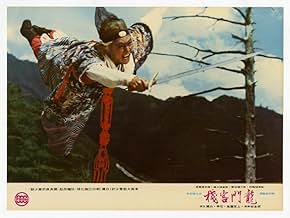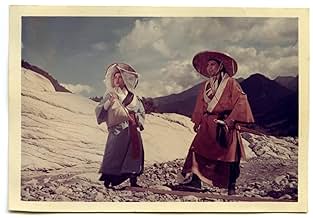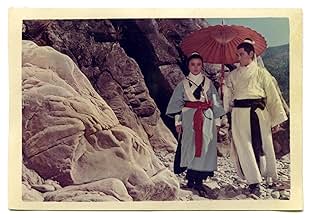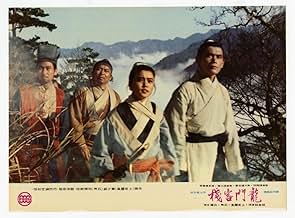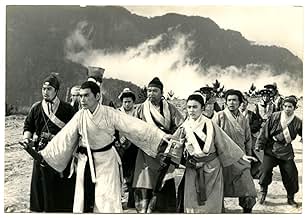IMDb RATING
7.4/10
4K
YOUR RATING
When the children of an executed General are pursued in 1457 China, some heroic martial arts swordsmen intervene.When the children of an executed General are pursued in 1457 China, some heroic martial arts swordsmen intervene.When the children of an executed General are pursued in 1457 China, some heroic martial arts swordsmen intervene.
- Awards
- 1 win & 1 nomination total
- Director
- Writer
- All cast & crew
- Production, box office & more at IMDbPro
Featured reviews
This is the original of the 1992 remake of the same title(with a NEW) and 2nd of the "INN" trilogy by King Hu after Come Drink With Me. It was a major hit all over Chinese areas in South East Asia and discovered Shang Kuan Ling Feng(note the mistake by a previous comment)as the 2nd most popular Sword woman(the 1st was Cheng Pei Pei, and later 3rd Hsu Feng(Hsia Nu aka A Touch of Zen). All these 3 females stars are made popular by him and they are also the 3 most popular swords women in Chinese Cinema.
If there is any complaint by any viewer, it's the pace that many may find it a bit slow but isn't most highly regarded movies slow ?? The finale scene is the most climatic in a Chinese action that critc compared this film to "Rio Bravo" and "The Wild Bunch".
Beware of some mistakes in the original English subtitles mentioned by the director himself.
You can watch some scenes of it if you go to the movie Bu San(2003) aka Goodbye, Dragon Inn(here in IMDb and watch the trailer) which paid tribute to this movie.
The 90's remake is nothing better except for an additional character well acted by Maggie Cheung.
If there is any complaint by any viewer, it's the pace that many may find it a bit slow but isn't most highly regarded movies slow ?? The finale scene is the most climatic in a Chinese action that critc compared this film to "Rio Bravo" and "The Wild Bunch".
Beware of some mistakes in the original English subtitles mentioned by the director himself.
You can watch some scenes of it if you go to the movie Bu San(2003) aka Goodbye, Dragon Inn(here in IMDb and watch the trailer) which paid tribute to this movie.
The 90's remake is nothing better except for an additional character well acted by Maggie Cheung.
10wataru-7
There are some movies that stick by you over the years and this Chinese swords movie from the middle sixties is one of them.
King Hu's Dragon Gate Inn has all the ingredients in it to make this movie a classic. Not only does it have good swords fights and combines these with an excellent story and plot but on a more subtle level the background music adds a really good atmosphere to it that draws you even more into the movie and story.
I can recommend this movie for anyone who is interested in Chinese film in general and anyone who is interested in Chinese swords movies with a good story and plot.
10 out of 10 points from me.
King Hu's Dragon Gate Inn has all the ingredients in it to make this movie a classic. Not only does it have good swords fights and combines these with an excellent story and plot but on a more subtle level the background music adds a really good atmosphere to it that draws you even more into the movie and story.
I can recommend this movie for anyone who is interested in Chinese film in general and anyone who is interested in Chinese swords movies with a good story and plot.
10 out of 10 points from me.
10Phil-302
A must see swordplay film, probably the best of its kind ever made. The director, King Hu, is the master of tension and suspense and holds the viewer's attention throughout. I cannot rate this fim highly enough. If only it were more readily available.
It's China in the year 1547. A minister has been executed and his two younger children sent into exile ... officially. The Eunuchs in charge and the bad boys of the Eastern Gate intend to kill them at the Dragon Inn on the border. As they move, however, an assortment of skilled swordsmen (and one swordswoman) show up at the Inn...
King Hu's martial arts movie has nasty villains, loner heroes, magnificent wide-screen Eastmancolor images (restored in 2013) and all sorts of crazy fight sequences in a dazzling array. There seem to be a few plot holes (people keep pausing in their fighting to talk), but that may be a matter of the standards of the Taiwanese cinema as opposed to my more western ideas. What strikes me in the storytelling technique is that the film maker seems to have seen and been influenced by the Man With No Name" trilogy, or at least YOJIMBO and SANJURO, drawing the same conclusions about cinema that Leone had. Chun Shin's character enters the Inn and encounters the agents of the Eastern Gate with the same wry, skilled, deadly sense of humor that Eastwood showed in his performances.
I'm not familiar with Taiwanese film-making of this era and genre. My experience has tended toward the Hong Kong offerings, with an emphasis on the Jacky Chan and Stephen Chow comedies. This is a very impressive introduction to the style and to King Hu
King Hu's martial arts movie has nasty villains, loner heroes, magnificent wide-screen Eastmancolor images (restored in 2013) and all sorts of crazy fight sequences in a dazzling array. There seem to be a few plot holes (people keep pausing in their fighting to talk), but that may be a matter of the standards of the Taiwanese cinema as opposed to my more western ideas. What strikes me in the storytelling technique is that the film maker seems to have seen and been influenced by the Man With No Name" trilogy, or at least YOJIMBO and SANJURO, drawing the same conclusions about cinema that Leone had. Chun Shin's character enters the Inn and encounters the agents of the Eastern Gate with the same wry, skilled, deadly sense of humor that Eastwood showed in his performances.
I'm not familiar with Taiwanese film-making of this era and genre. My experience has tended toward the Hong Kong offerings, with an emphasis on the Jacky Chan and Stephen Chow comedies. This is a very impressive introduction to the style and to King Hu
I speculate that King Hu must have left Shaw Brothers with a bad taste in his mouth after doing "Come Drink With Me". "Come Drink with Me" is also one of the greatest martial arts movies despite having room for improvement. This movie feels to me like King Hu made those improvements in it. I consider this his is his masterpiece. I compare it to the movies of Akira Kurosawa. Too bad that King Hu was nowhere near as prolific. This movie could even be considered his one hit wonder.
King Hu seemed to realize the claustrophobic situation of of the good guys and bad guys face to face in the Dragon Inn was great drama but it had to be contrasted with as much wide open space as possible. In "Dragon Inn" most scenes outside the inn are shot in expansive panoramas. Like Kurosawa, King Hu appreciated the way moving the camera brought the audience into the scene. He used tracking shots, particularly during fight sequences, to get this feeling.
Hang Ying-Chieh gets credit as action coordinator. He was the Big Boss in Bruce Lee's "The Big Boss". Remember when Bruce is cut, wipes off his blood then tastes it? Hang Ying-Chieh does the same here. The sword fights are Japanese style - starting with a suspenseful face off, then a sudden attack to cover the distance, just a few quick strokes of action, then stop and wait a few seconds to feel the results. A real sword cut is initially almost painless so the person cut doesn't know until he sees the effect of the cut.
I rate this as one of the best of 1967 and I recommend it to everyone - not just fans of the genre - to everyone.
King Hu seemed to realize the claustrophobic situation of of the good guys and bad guys face to face in the Dragon Inn was great drama but it had to be contrasted with as much wide open space as possible. In "Dragon Inn" most scenes outside the inn are shot in expansive panoramas. Like Kurosawa, King Hu appreciated the way moving the camera brought the audience into the scene. He used tracking shots, particularly during fight sequences, to get this feeling.
Hang Ying-Chieh gets credit as action coordinator. He was the Big Boss in Bruce Lee's "The Big Boss". Remember when Bruce is cut, wipes off his blood then tastes it? Hang Ying-Chieh does the same here. The sword fights are Japanese style - starting with a suspenseful face off, then a sudden attack to cover the distance, just a few quick strokes of action, then stop and wait a few seconds to feel the results. A real sword cut is initially almost painless so the person cut doesn't know until he sees the effect of the cut.
I rate this as one of the best of 1967 and I recommend it to everyone - not just fans of the genre - to everyone.
Did you know
- TriviaDirector King Hu encouraged his martial arts choreographers to draw from the alternately fluid and rhythmic movements of Chinese opera. Rather than resorting to fast or slow motion, footage printed backward, animation, or other early special-effects techniques, the filmmaker relied as much as possible on the actual skills of his performers and on the magic of editing.
- ConnectionsFeatured in Goodbye, Dragon Inn (2003)
- How long is Dragon Inn?Powered by Alexa
Details
- Release date
- Countries of origin
- Language
- Also known as
- Die Herberge zum Drachentor
- Filming locations
- Production company
- See more company credits at IMDbPro
Contribute to this page
Suggest an edit or add missing content



